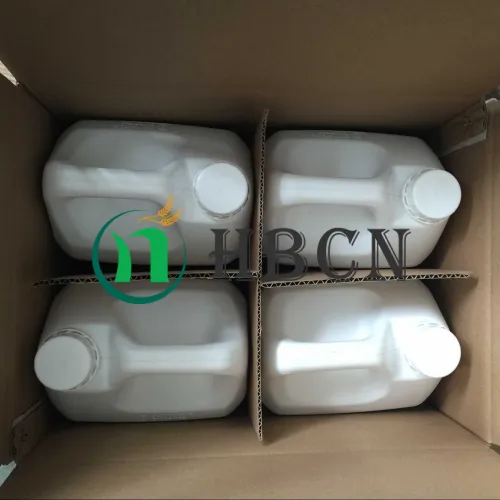
Dez . 15, 2024 05:22 Back to list
Exploring the Use of Nicosulfuron Herbicide in Modern Agriculture Practices
Nicosulfuron Herbicide An Overview
Nicosulfuron is a selective herbicide that primarily targets a range of grass weeds in various crops, particularly in the family of corn (maize). As part of the chemical family known as sulfonylureas, nicosulfuron operates through a unique mode of action that inhibits the synthesis of certain amino acids essential for plant growth. This herbicide is widely used in agricultural settings due to its effectiveness, low required application rates, and specific action against undesirable grass species, making it an important tool for farmers.
Chemistry and Mechanism of Action
Nicosulfuron, chemically classified as 2-(4,6-dimethoxy-2-pyrimidinyl)-1-(2-methylphenyl) sulfonylurea, targets the plant's enzyme pathway involved in the synthesis of branched-chain amino acids—valine, leucine, and isoleucine. By inhibiting this biosynthetic pathway, nicosulfuron prevents the growth and reproduction of the target grass weeds while allowing broadleaf crops, including corn, to thrive. This selective action is beneficial not only for crop yields but also for reducing competition from invasive grass species.
The herbicide is absorbed mainly by the foliage and subsequently translocated to the meristematic tissues, where it disrupts cellular function. As a result, affected plants exhibit stunted growth, chlorosis, and eventual death. Farmers often appreciate the rapid action of nicosulfuron, with visible effects typically occurring within a few days of application.
Application and Usage
Nicosulfuron is often used in both pre- and post-emergence applications, though it is most commonly applied post-emergence to manage existing grass populations. The recommended application rates generally range from 15 to 50 grams per hectare, depending on the weed species targeted and the environmental conditions. Because of its systemic nature, nicosulfuron can effectively control weeds that have already emerged while minimizing harm to the crops planted within the same field.
nicosulfuron herbicide

Farmers utilize nicosulfuron as part of integrated weed management (IWM) strategies. It is often combined with other herbicides to broaden the spectrum of weed control and reduce the likelihood of resistance development in weed populations. Additionally, due to its low toxicity to mammals, birds, and aquatic organisms, nicosulfuron poses minimal risk when used according to label directions.
Environmental Impact and Resistance Management
As with any chemical treatment, environmental considerations surrounding nicosulfuron usage are significant. The herbicide is classified as moderately persistent in the soil, but its varied degradation rates can depend on factors such as soil type, temperature, and moisture levels. To minimize environmental impact, it is crucial to adhere to recommended usage guidelines, including proper application timing and methods to reduce runoff.
Moreover, resistance management is an essential concern in modern agriculture. Continuous use of a single herbicide can result in resistance development in weed populations. Consequently, employing crop rotation, varying herbicide modes of action, and integrating non-chemical weed control methods can help mitigate resistance issues.
Conclusion
Nicosulfuron herbicide plays a vital role in modern agricultural practices, particularly in the management of grass weeds in corn production. Its effectiveness, low application rates, and selective action allow farmers to enhance crop productivity while minimizing the impact on non-target species. Responsible use, including adherence to guidelines and integrated management strategies, is essential for sustainable agriculture. As farmers face the ongoing challenges of weed resistance and environmental sustainability, nicosulfuron remains a valuable component of the herbicide toolbox, contributing significantly to the efficiency and productivity of crop management systems. By balancing efficacy with ecological responsibility, nicosulfuron can help support the ever-growing demands of global food production.
-
Famoxadone Fungicide: Prevent & Cure Plant Diseases Effectively
NewsAug.26,2025
-
Topramezone Herbicide: Selective & Powerful Weed Control for Corn
NewsAug.24,2025
-
Powerful Fungicide for Optimal Crop Health & Yield Protection
NewsAug.23,2025
-
Azoxystrobin Fungicide: Advanced Crop Protection Solutions
NewsAug.22,2025
-
Willowood Imidacloprid: Best Broad-Spectrum Insecticide Solution
NewsAug.22,2025
-
Atrazine Herbicide: Selective & Effective Weed Control for Sale
NewsAug.21,2025
